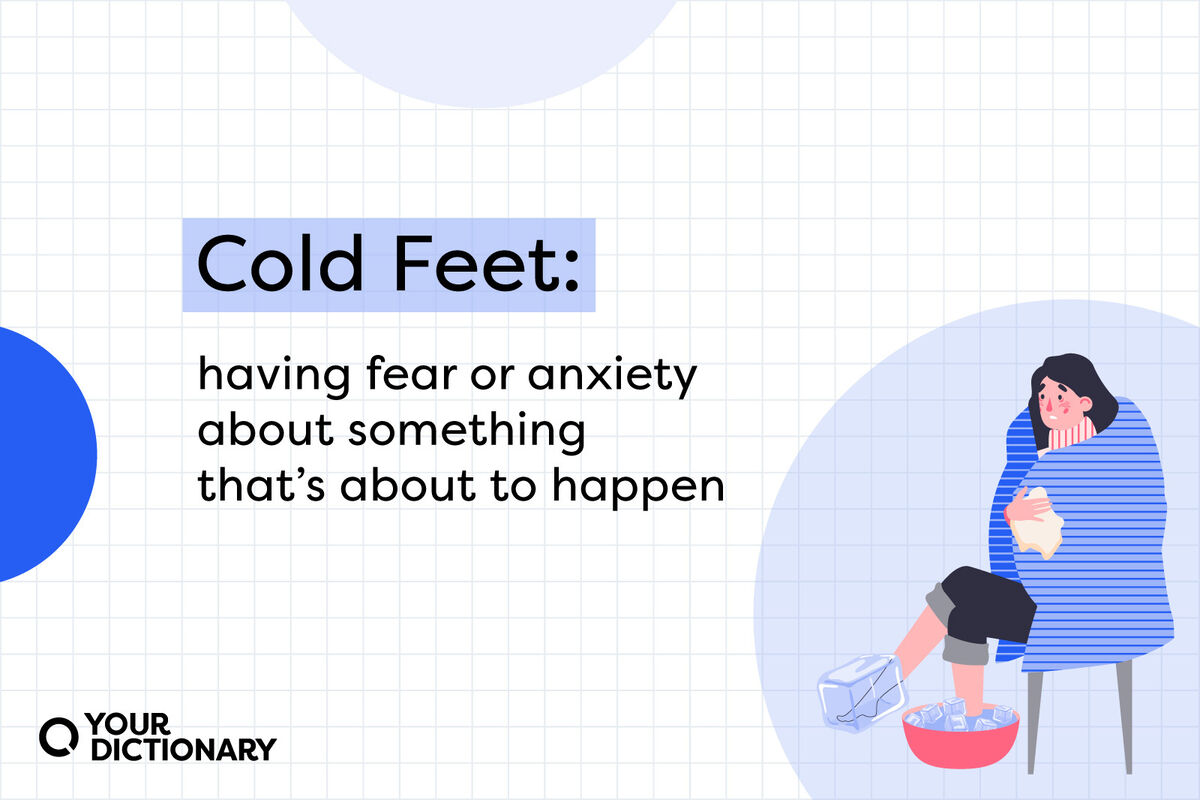
Polar bears, penguins, and snowmen aren’t the only ones who get cold feet. (Snowmen don’t actually have feet, but you get the idea.) Anyone can get cold feet if a situation is stressful enough. But where does this odd phrase come from — and does it actually have anything to do with your feet?
What Does “Getting Cold Feet” Mean?
Getting cold feet is an idiom that means you’ve lost the courage to do something. Lots of moments might be stressful enough to cause cold feet, including:
|
Situation |
Example Sentence |
|
getting married |
The bride got cold feet and canceled the wedding. |
|
running a race |
I got cold feet before the marathon, so I didn’t run. |
|
making a speech |
Mr. Ferrell got cold feet and didn’t make his announcement. |
|
admitting the truth |
We wanted to tell you what happened right away, but we got cold feet. |
|
making a major life change |
The Mayers family got cold feet about moving, so they canceled the sale of their home. |
|
asking someone out |
I like Thomas so much, but I get cold feet every time I try to ask him on a date. |
Synonyms for “Cold Feet”
If chilly feet isn’t the image you’re going for, you can convey a loss of courage with different idioms. Other ways to say “lose courage” include:
- chicken out (I wanted to talk to her, but I chickened out.)
- freeze up (She always freezes up when she speaks in public.)
- lose your nerve (Don’t lose your nerve before your audition.)
- lose face (We lost face in the middle of the game.)
- wimp out (I wimped out after seeing the competition.)
Where Does “Cold Feet” Come From?
Since our feet don’t literally get cold when we lose courage, it’s difficult to see the origin of this distinctive phrase. But looking into the history of cold feet gives us a few theories (and some very interesting stories).
Possible Italian Roots of “Cold Feet”
Some note the similar Italian phrase (aver freddo ai piedi — “to be cold in the feet”) as the origin of the modern idiom cold feet. It first appeared in the Italian play Volpone in 1605:
Let me tell you: I am not, as your Lombard proverb saith, cold on my feet; or content to part with my commodities at a cheaper rate, than I accustomed: look not for it.
In this context, cold on my feet doesn’t mean “losing courage”; rather, it means “to be without money.” Even today, aver freddo ai piedi doesn’t translate to the modern figurative meaning of cold feet.
Germany, Poker, and “Cold Feet”
Others trace the origin of cold feet to the German idiom kalte Füße bekommen, which means exactly the same thing (“to get cold feet”) with the same figurative meaning (“to lose courage”).
The phrase first appeared in an 1878 English translation of the German novel Seed-time and Harvest, when a character leaves the poker table when his luck — and his feet, allegedly — are cold.
"So?" said the rector, hotly, for he was determined to retain his winnings, "haven't I as good a right to cold feet as you? Don't you always get cold feet, at our club, when you have had good luck?" and he carried it out, he kept his cold feet, and his winnings, and after a little while the two city people drove off, taking Bräsig with them.
Blaming one’s cold feet was not an uncommon way to avoid losing the rest of your money at a poker table in the 19th century. While this usage refers to the character’s actual feet (and their supposed coldness), it also links the phrase to a lack of courage — which would later become its figurative meaning.
First Figurative Appearance in Print
According to the Oxford English Dictionary, the first idiomatic use of cold feet came in Stephen Crane’s second edition publication of Maggie: Girl on the Streets, in 1896.
The mere boy occupied himself with cocktails and cigar. He was tranquilly silent for half an hour. Then he bestirred himself and spoke.
“Well,” he said, sighing, “I knew this was the way it would be. They got cold feet.”
Though there’s not much textual evidence linking the German usage of cold feet less than two decades earlier, Crane’s casual use of the idiom suggests that the phrase had become common by 1896.
“Cold-Footers” and the Great War
By 1916, the related term cold-footers (and cold-feeters in Australian) was a derogatory name for those who refused to fight in World War I, similar to draft dodgers. Some believe that the phrase connects to a soldier developing frostbite, thus having to leave the battlefield; however, the appearance of cold feet in literature before World War I does suggest that the phrase already had a colloquial meaning of “losing courage.”
What’s the Opposite of “Getting Cold Feet”?
If you overcome your cold feet, does that mean you’ve got warm feet instead? Not quite (though that would make sense). You can show your courage with these idioms:
- bold as brass
- face your fears
- chin up
- pluck up your courage
- put on a brave face
- put your money where your mouth is
- take heart
Don’t Get Cold Feet About Learning Idioms
Now that your feet are nice and warm (figuratively speaking), learn the origins of other idioms that you may find in your everyday speech. Does it hurt when you tell a friend to “break a leg”? If it starts raining cats and dogs, does that mean you get an unlimited supply of new pets?